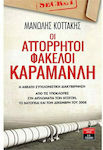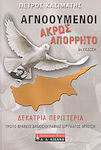Skroutz Buyers Protection
Η Αλγερινή επανάστασηCode: 285716
- Author: Δημήτρης Λιβιεράτος
- Publisher: Koukkida
- Μορφή: Soft Cover
- Έτος έκδοσης: 2006
- Αριθμός σελίδων: 271
- Κωδικός ISBN-13: 9789608796355
- Διαστάσεις: 24×16
Δημήτρης Λιβιεράτος
Similar products


 Top rated
Top rated
Political Books
Αγνοούμενοι: Άκρως απόρρητο, Δεκατρία περιστέρια: Οι τελευταίοι επιζώντες αγνοούμενοι της Κύπρου: Οι μυστικές αποστολές σωτηρίας τους
Ad from Xryso FteroAdded

Political Books
Στον αστερισμό του εθνικισμού, Αλβανία και Ελλάδα στη μετα-Χότζα εποχή
from 14,44 €Added Top rated
Top rated

Political Books
Μεταπολίτευση 1974-1975 50 Ερωτήματα Και Απαντήσεις, 50 Questions and Answers
Ad from SelefaisAdded


All shops
Prices are calculated for:Malta, Other Payment Options
- 11,87 €
- 11,90 €
Description
[...] The country has great prospects. Endowed by nature, it gradually exploits its resources. Especially oil and natural gas, which have been significant in recent years.
In 1962, when Algeria became an independent state, the first president was Ahmed Ben Bella, one of the historical leaders of the revolution. In those early years, he tried to lead the country towards a self-managed socialism, with all its local characteristics, with the help of exceptional revolutionaries, such as Michalis Raptis-Pablo and Egyptian Lotfi Soliman.
On June 19, 1965, the coup d'état of army chief Houari Boumédiène took place. The country regressed towards a state-controlled capitalism of military discipline. In the following years, the army would direct the state, without much success. On December 23, 1978, Boumédiène died, and he was replaced by another military figure, Chadli Bendjedid.
In 1979, imprisoned Ben Bella was released. The ideals of the revolution were not fully realized. Social liberation seemed, at first, achievable. However, it was not completed. Self-management was swept away by military bureaucracy. The vision of socialism faded. The military envied the superficial discipline and prosperity of Eastern countries. A mixture of Islamic orthodoxy and Stalinist discipline, similar to that of Eastern countries.
The economic situation does not progress at the necessary pace, and unemployment afflicts the country. As a result of this social regression, accompanied by many disturbances, an Islamic protest movement developed. Part of this movement eventually led to armed struggle with many casualties. In 1989, a new Constitution was voted, leading to a multiparty parliamentary democracy. The Islamists strengthened, and the government declared their movement illegal. On November 28, 1996, a new Constitution was voted.
On October 1, 1997, the Islamists ceased their operations. On April 15, 1999, Abdelaziz Bouteflika was elected president, a position he still holds today.
The Algerian Revolution gained particular significance in modern history. The struggle of its people essentially overthrew the entire structure of French colonialism in Africa. The revolution that began on November 1, 1954, stirred the morale of neighboring countries. And as long as it lasted, despite facing the intervention of French forces, it became a living example for peoples whose leadership hesitated. The possibility of uprising was visible. They hastened to conclude negotiations. Morocco became an independent country on March 2, 1956, and Tunisia on March 20, 1956. By 1960, the entire structure of Africa was overturned, and many new independent states, however weak they may have been, emerged in the Black Continent. The Algerian Revolution accelerated the dissolution of colonialism and opened new paths. [...]
(from the book's preface)
Specifications
- Format
- Soft Cover
- Number of Pages
- 271
- Publication Date
- 2006
- Dimensions
- 24x16 cm
Important information
Specifications are collected from official manufacturer websites. Please verify the specifications before proceeding with your final purchase. If you notice any problem you can report it here.





















































